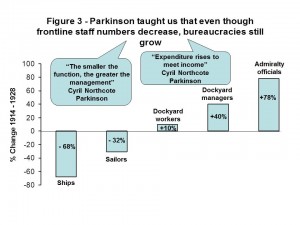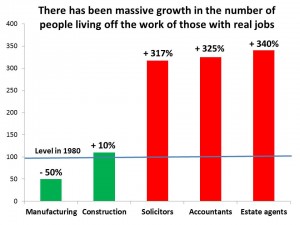Writing in the Economist in 1955 Cyril Northcote Parkinson gave us what came to be known as Parkinson�s Law: �Work expands so as to fill the time available for its completion�.
While employed in the British Civil Service, Parkinson observed that a bureaucracy will grow at a rate of five to seven per cent a year �irrespective of any variation in the amount of work (if any) to be done�. One example he gave was from the Royal Navy where, between 1914 and 1928 the number of ships fell by 68 per cent and the number of sailors by 32 per cent. At the same time, the number of dockyard managers went up by 40 per cent and the number of Admiralty officials increased by 78 per cent�(click to see more clearly)
Parkinson had identified and quantified how bureaucracies and professional organisations always seem to find real or fictitious work for themselves which leads to the apparent necessity for them to keep growing, keep hiring more staff and as a result keep paying themselves ever more because of the increasing amount of work they either have to do or else create for themselves.
We can now see this phenomenon in the British private sector. In the thirty three years from 1980 to 2013, the number of solicitors in Britain rocketed up from about 37,800 to over 120,000; the number of accountants from around 100,000 to above 325,000 and estate agents from around 165,000 to more than 562,000. At the same time, the number of those employed in construction was fairly stagnant and the number working in manufacturing halved (click to see more clearly)
There was a similar situation in politics. In 1997, we had 650 MPs at Westminster. In spite of the fact that we keep reducing the power of the British Parliament by handing over ever more decision-making to the rapidly expanding and increasingly expensive Brussels bureaucracy, by 2014 we also had 129 Members of the Scottish Parliament, 108 Members of the Legislative Assembly of Northern Ireland and 60 Members of the Welsh Assembly in addition to our 650 Westminster MPs. In fact, we had so many politicians In Britain doing ever less law-making, that the Westminster Parliament started shortening its sessions each year as it ran out of anything useful to do.
This also happened throughout the public sector. The budget for the Financial Services Authority, the regulator for the financial services industry, for example spiralled up from �29 million in 1997 to over �526 million a year by 2013, the year in which it was scrapped. In 2006/7, the year before the financial crisis, the budget for Ofwat, the regulator for the water industry, was �11.5 million. By 2012/13 it had reached �20.1 million and then rose again in the following year to �27.9 million � more than doubling in just seven years. Meanwhile over at Ofgem, the regulator for the gas and electricity markets, its costs leapt up from �38.8 million to �73.3 million by 2012/13 and then to �83.3 million by 2013/14 � a similar picture of an increasingly bloated bureaucracy that we saw at Ofwat.
And in our supposedly �cash-strapped� NHS there were about 200,000 hospital beds and 25,000 managers in 1997 when New Labour first came to power giving us around 8 beds per manager. Yet by 2014 we had just under 140,000 hospital beds and about 38,000 managers � a mere 3.7 beds per manager. This was a truly astonishing collapse in managerial productivity, while, of course, managerial salaries in the �cash-strapped� NHS more than doubled in spite of the amount of real, useful work being accomplished apparently more than halving.
















The private sector pays for the public sector. How much longer can the expansion of the public sector continue? We use more manufactured goods than we produce, the same goes for food. We import more than we export. It just doesn’t add up. The country is run along the lines of a welfare dependent dysfunctional “super” family.
My children are all doing “real” jobs. Two are teachers, two work at the sharp end of the NHS – they actually see, diagnose and treat patients. All are having their working lives made misery and their stress levels augmented to almost intolerable levels by the never-ending, relentlessly increasing, amount of “box-ticking” required by “managers” – not one of whom could do the jobs they purport to oversee. Teachers now spend as much time on this pointless exercise as they do in the classroom, whilst educational standards decline. (A Level results, out tomorrow, promise to be interesting!) For myself, a decade ago, when I retired, I seized the opportunity then offered to fulfil a lifetime ambition and attend the excellent Adult Education classes in foreign languages which were being offered by the local Education Authority. These have now all been “bureaucratized” out of existence – teachers of many years’ experience, superlative at their profession, have all withdrawn from the Adult Ed service, being unwilling to change their teaching methods, the worth of which had been proven over decades, to accommodate the latest fads of County Hall “managers”, few if any of whom could actually speak the languages being taught in the classes over which they had the effrontery to “mediate”!
Meanwhile, as many of us know, despite Chancellor Osborne’s oft-repeated claim that the UK economy is back on track and the recession is over, we actually as a nation manufacture less and less. In almost all UK industry, the most we do is assemble parts designed and manufactured elsewhere. Our National Debt, now many times what it was when the appalling Gordon Brown quit, doesn’t bear thinking about, our politicians are almost without exception self-seeking and mendacious, we bow and scrape to “Europe” and we have permitted our “green and pleasant land” to be taken over by alien cultures and religions.
Not a lot of hope really, is there?
I’m an engineer working for a company that (gasp) manufactures electronic and fibre optic products. I consider the biggest threat to our continued existence to be the UK government and, by extension, the EU.